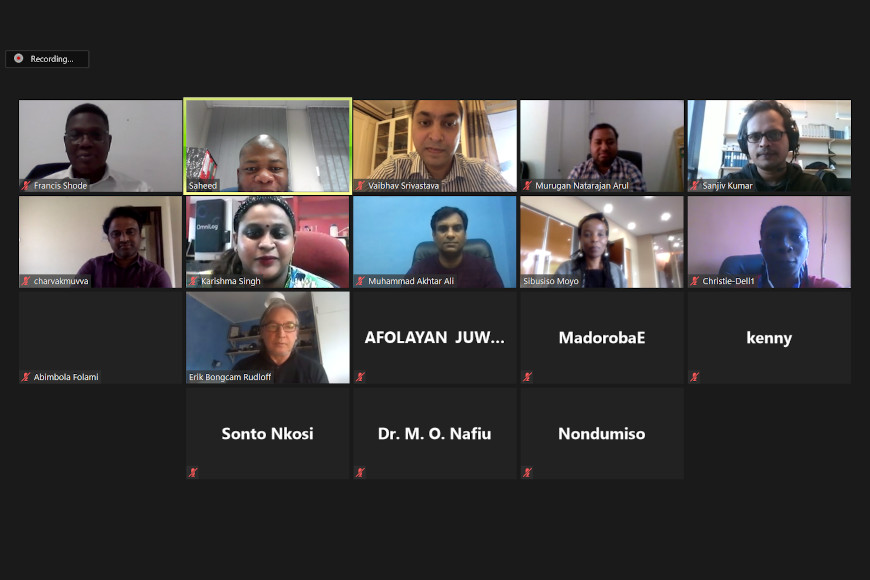The first virtual workshop by South Africa-Sweden University Forum (SASUF) on appreciation of computational bioscience, was jointly organised by the Durban University of Technology (DUT) and KTH Royal Institute of Technology, Sweden, last Monday, 23 November 2020 via Zoom.
The South Africa-Sweden University Forum (SASUF) is a strategic internationalisation project running from 2017-2020 with the overall aim of strengthening ties between Sweden and South Africa in research, education and innovation. SASUF is a collaboration between 37 universities in Sweden and South Africa together with embassies, civil society organisations, funding agencies and ministries in both countries.
The SASUF workshop brought together researchers from Sweden and South Africa, to discuss and create innovative ways to approach internationalisation and utilise the power of digital tools in international collaboration.
The workshop also connected researchers with funding agencies, industry, ministries and surrounding society in working towards the Sustainable Development Goals (SDGs).
SASUF is funded by STINT (Swedish Foundation for International Cooperation in Research and Higher Education), the participating universities, the National Research Foundation and the Department of Higher Education and Training in South Africa.
The workshop had the blessings of the Deputy Vice-Chancellor: Research, Innovation and Engagement of DUT, Prof. Sibusiso Moyo, who commended the appropriateness of the programme and stressed that it is in tune with one of the University’s visions of fostering research, networking and international collaboration engagement among researchers.
The organisers of this online event were Dr Saheed Sabiu (DUT, South Africa), Dr N A Murugan and Dr Vaibhav Srivastava from KTH, Sweden.
The workshop was well attended by participants from Sweden (KTH, Uppsala University and Swedish University of Agriculture), South Africa (CUT, TUT, UKZN and UniZulu), Nigeria (KWASU, FUTA and Unilorin), and India (BiomAILS pvt ltd).
The main theme of the session was “Computational assessment of bioactive compounds of therapeutic significance”. Speaking on the programme, Dr Saheed said the idea behind the programme was to enable collaboration between the participating researchers and for knowledge transfer and capacity development, particularly within the niche of biocomputional applications.
“The climax of the event was the hands-on training on computational tools to screen hits for identification of small molecule targets of therapeutic significance, and presentations on burden of diseases in South Africa and Sweden,” he said.
He further stressed that the programme was also used to foster research engagements, strengthening of international prospects of emerging researchers and paved way for further collaborative works as contained in Sustainable Development Goal 17 (SDG 17). The programme had experts in biocomputational science and lasted for a whole day. The programme is already fostering new collaborative engagements in a way that will contribute towards improvement in overall health management systems in the two countries,” said Dr Saheed.
Various presentations were done by academic scholars such as Dr Sabiu Saheed (DUT, South Africa), who spoke on CYP3A4 isoform as a key target for drug-drug interaction of therapeutic compounds.
Professor Shode Francis (DUT, South Africa), gave an overview on the exploration of underutilized medicinal plants for ethnopharmaceuticals and nutraceuticals.
Other presenters included Prof Rajshekhar Karpoormath (UKZN, South Africa), Dr Kehinde Idowu (UKZN, South Africa), Dr Vaibhav Srivastava (KTH, Sweden), who relayed more on Sustainable approaches for controlling Saprolegnia infections in aquaculture: from drug discovery to target characterization.
Dr Muhammad Akhtar Ali (KTH, Sweden), Dr N Arul Murugan, (KTH, Sweden), who focused on the Current status of computational therapeutics development, as well as Dr Charuvaka Muvva, from the BiomAILS pvt ltd. There was also a workshop on computational screening to identify lead compounds.
Overall, judging by the results of analyses of feedback received at the end of the event, the participants craved for more similar sessions on computational applications to allow for proficiency and better understanding of inherent concepts. Such initiative will help in realizing the goal of capacity building and knowledge transfer to the next generation of researchers within the niche of molecular dynamics.
Going forward, to keep taps on the event, similar programmes are being planned on an annual basis in line with SASUF agenda 2030.
Dr Saheed is a Senior Lecturer at the Department of Biotechnology and Food Science, DUT, and he is currently researching into the detailed concepts of therapeutic mechanisms of secondary metabolites in degenerative and microbial diseases while reporting health benefits in a way that will provide valuable data which will lead to new small molecule targets that could potentially be lead for drug discovery.
Pictured: Delegates at the SASUF online workshop.
Waheeda Peters


